|
|
|
Sort Order |
|
|
|
Items / Page
|
|
|
|
|
|
|
| Srl | Item |
| 1 |
ID:
192165


|
|
|
|
|
| Summary/Abstract |
For nearly four decades, Australia’s domestic and international economic policies were anchored by the promotion of open, transparent, and rules-based market exchange. This was considered the best way to increase both Australia’s prosperity and its security, and that belief guided Canberra’s approach to economic statecraft. However, emerging concerns about the vulnerabilities arising from economic interdependence, and the increasingly blurry line between economics and security amid great power rivalry between China and the United States, have placed Australian policy orthodoxy in a difficult position. In this paper, we investigate how these dynamics are shaping change and continuity in Australia’s economic statecraft, and in doing so offer three contributions. First, to advance the emerging comparative economic statecraft research agenda, we propose a modified concept of economic statecraft that captures a wider range of activities undertaken by non-great powers and a distinction between state-based and market-based actions which allows for within- and cross-case comparisons. Second, empirically, we sketch the historical evolution of Australia’s approach and examine three salient domains in which it has recently pursued new economic statecraft initiatives. Finally, in evaluating recent change and continuity, our third contribution is to identify new variables that may illuminate the conditions under which states adapt their prevailing approach to economic statecraft.
|
|
|
|
|
|
|
|
|
|
|
|
|
|
|
|
| 2 |
ID:
140319
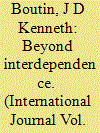

|
|
|
|
|
| Summary/Abstract |
China’s economic and politico-military development is placing considerable strain on the established framework of the trilateral relationship between itself, the United States, and Australia. Specifically, China’s rise is generating security concerns that are politicizing economic relations between the three states. A more guarded approach to economic collaboration will transform trilateralism, which up to now has been characterized by the scope allowed for the discrete pursuit of security and economic relations. This will force political authorities to carefully consider their policy priorities and further strain relations between the states, as well as supporting a more cautious approach to China on the part of the United States and Australia.
|
|
|
|
|
|
|
|
|
|
|
|
|
|
|
|
| 3 |
ID:
072963
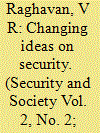

|
|
|
| 4 |
ID:
131980


|
|
|
|
|
| Publication |
2014.
|
| Summary/Abstract |
From 1965 to the present, Colombia has been confronted by the insurgency of the Revolutionary Armed Forces of Colombia (FARC). The threat reached a new level in 1996 with the advent of mobile warfare, whereby large units sought to neutralize the military in an effort to seize power and institute a Marxist-Leninist regime. Unlike Vietnam, what followed was a regaining of the strategic initiative by the government and a decimation of the insurgent threat. This was accomplished with US assistance but from first to last was driven by Colombian leadership and strategy. The strategy which led to this signal change, 'Democratic Security', unfolded under the leadership of President Álvaro Uribe. It was a civil-military partnership, which sought to expand the writ of Colombian democracy to all elements of society. Securing the population provided the shield behind which economic, social, and political life could occur as driven by the will of the people. It was the agreement upon legitimacy as the strategic goal and reform as the route to that goal which allowed the Colombians and the Americans to work so well together.
|
|
|
|
|
|
|
|
|
|
|
|
|
|
|
|
| 5 |
ID:
058986
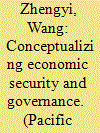

|
|
|
| 6 |
ID:
077038
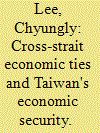

|
|
|
| 7 |
ID:
117218
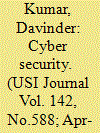

|
|
|
| 8 |
ID:
120203
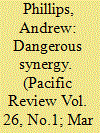

|
|
|
|
|
| Publication |
2013.
|
| Summary/Abstract |
This paper analyzes the current and prospective implications of Asia's energy consumption revolution for regional stability. Adopting a comparative and historical approach, I argue that Japanese energy security anxieties worked to reinforce regional alignment patterns in East Asia for nearly two decades following the Shanghai communiqué, thereby strengthening regional stability. Conversely, the post-Cold War period has seen in China and India's rise the emergence of Asian energy super-consumers that are not formally aligned with the United States, but that are increasingly dependent on imported energy supplies to fuel their industrialization. This newfound dependence on energy imports has seen both countries follow Japan's longstanding example in securitizing energy as a policy issue. In the context of an already more contested Asia, this trend towards energy securitization has aggravated regional tensions and will continue to do so unless greater efforts are undertaken bilaterally, regionally and globally to foster more effective forms of energy cooperation.
|
|
|
|
|
|
|
|
|
|
|
|
|
|
|
|
| 9 |
ID:
076263


|
|
|
|
|
| Publication |
Hampshire, Ashgate Publishing Limited, 2006.
|
| Description |
xvi, 247p.
|
| Series |
Global security in changing world
|
| Standard Number |
9780754647737
|
|
|
|
|
|
|
|
|
|
|
|
Copies: C:1/I:0,R:0,Q:0
Circulation
| Accession# | Call# | Current Location | Status | Policy | Location |
| 052265 | 327.1/MAC 052265 | Main | On Shelf | General | |
|
|
|
|
| 10 |
ID:
159814
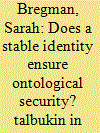

|
|
|
| 11 |
ID:
138364
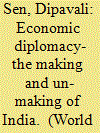

|
|
|
|
|
| Summary/Abstract |
On the global scene, India has recently been playing tactics of Economic Diplomacy. A statecraft, Economic Diplomacy is an attempt to arrive at some agreement between nations that was not coming about by itself. It involves negotiation and tries to prevent any violent conflict like war. It is extra-market, and takes the countries concerned beyond market equilibrium solutions indicated by mainstream economic theory. This article points out that it is in contrast, if not in contradiction, with prevalent theories on foreign trade. In 2004 the Association of Indian Diplomats had traced it to countries of Europe but this article emphasizes that economic diplomacy was practiced in India itself in epic as well as mediaeval times.
|
|
|
|
|
|
|
|
|
|
|
|
|
|
|
|
| 12 |
ID:
048113
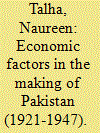

|
|
|
|
|
| Edition |
1st ed.
|
| Publication |
Oxford, Oxford University Press, 2000.
|
| Description |
x, 220p.hbk
|
| Standard Number |
0195791843
|
|
|
|
|
|
|
|
|
|
|
|
Copies: C:2/I:0,R:0,Q:0
Circulation
| Accession# | Call# | Current Location | Status | Policy | Location |
| 042523 | 954.91/TAL 042523 | Main | On Shelf | General | |
| 043920 | 954.91/TAL 043920 | Main | On Shelf | General | |
|
|
|
|
| 13 |
ID:
102815
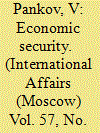

|
|
|
|
|
| Publication |
2011.
|
| Summary/Abstract |
THE WORLD ECONOMIC CRISIS of 2008-2010 has highlighted a number of world economic problems, reminding us once again of their global nature. Among these, particular attention should be paid to the problem of national and international economic security (ES) with its essential, closely interrelated but relatively independent aspects such as food, financial, energy and environmental security. In these conditions, quite logically, publications on ES problems that were so widespread in the last decade of the 20th century in view of the upheavals associated with the collapse of "real (actually existing) socialism" have once again become, though for different reasons, a more noticeable phenomenon in Russian and foreign literature.
|
|
|
|
|
|
|
|
|
|
|
|
|
|
|
|
| 14 |
ID:
163407
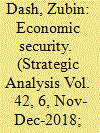

|
|
|
| 15 |
ID:
190137
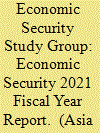

|
|
|
|
|
| Summary/Abstract |
Ensuring Japan's technological and industrial competitiveness is an important issue from the perspective of economic security. Given Japan's current advanced technological capabilities, it is necessary to consider the kind of technology that should receive investment from the viewpoint of mid- to long-term economic security; also important is how technology policy should be formulated.
In fiscal year 2021, the Economic Security Study Group of Nakasone Peace Institute (NPI) examined AI/machine learning, quantum computers, and next-generation communication technologies, particularly from the perspective of ensuring Japan's superiority and thus indispensability, and compiled a set of recommendations.
|
|
|
|
|
|
|
|
|
|
|
|
|
|
|
|
| 16 |
ID:
058989
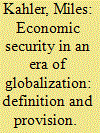

|
|
|
| 17 |
ID:
058984
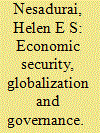

|
|
|
| 18 |
ID:
192157
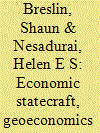

|
|
|
|
|
| Summary/Abstract |
In this introduction to the special issue, we establish the overarching objective for the collection; to investigate the salience and efficacy of conceptions of Economic Statecraft (ES) and Geoeconomics for understanding and explaining shifts in state-market relationships in a number of regional political economies. After a very short overview of different generations of ES research, we establish the set of common questions that each of the papers address, and how we arrived at them as the research project evolved. We point to the importance of ensuring that ES is not just thought of as something that the more powerful regional states engage in, and the need to adopt a three-part analytical distinction between different components of ES: motivations and objectives; actions and tools; and outcomes and consequences. This allows us to trace the relationship between goals and effects, provides a basis for comparative studies, and makes it easier to make a distinction between ES and other forms of state involvement in the economy.
|
|
|
|
|
|
|
|
|
|
|
|
|
|
|
|
| 19 |
ID:
190136
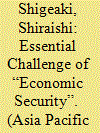

|
|
|
|
|
| Summary/Abstract |
The argument that “the end of the Cold War will bring history to an end with the final triumph of a free economy and democracy” was incorrect. As the US-China confrontation developed, economic security was discussed in Japan. In May 2022, the Economic Security Promotion Act was passed. The essential challenge of economic security is to “strike a balance between economic logic and political logic from the perspective of maximizing national interests.” However, it is not easy to strike a balance between the logic of the economy, which seeks economic efficiency based on market principles, and the logic of politics, which seeks values different from economic efficiency, such as democracy. How Japan, which has its own relationship with the United States and China, respectively, will be able to achieve this balance between the two countries is a historical challenge. Japan must make endless efforts to fulfill its role in bringing stability to the international system.
|
|
|
|
|
|
|
|
|
|
|
|
|
|
|
|
| 20 |
ID:
166747
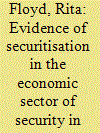

|
|
|
|
|
| Summary/Abstract |
Although the Copenhagen school’s securitisation theory and their sectoral analysis are integral parts of European security studies, the school’s economic sector of security has almost been completely ignored. In this article I examine why this is, and whether it makes sense to retain this sector. In the process I flesh out the logic of securitisation in the economic sector. I suggest that one reason why the economic sector of security has been neglected is that real life examples fitting the Copenhagen school’s logic of security as the exception have – in this sector – remained outstanding. Research in other sectors of security has shown however that securitisation does not need to include extraordinary countermeasures; instead it can play out below the level of the exception. Using alternative formulations developed in securitisation studies that relax the threshold for the success of securitisation, I attempt to locate evidence of economic securitisation by looking at two empirical cases. 1) Russia’s economic blackmail of Ukraine at the start of that country’s ongoing crisis. 2) The EU’s conditional bailout of Cyprus during the Eurozone crisis which necessitated capital controls. On the basis of the empirical evidence gathered I conclude by arguing the case for the economic sector of security.
|
|
|
|
|
|
|
|
|
|
|
|
|
|
|
|
|
|
|
|
|